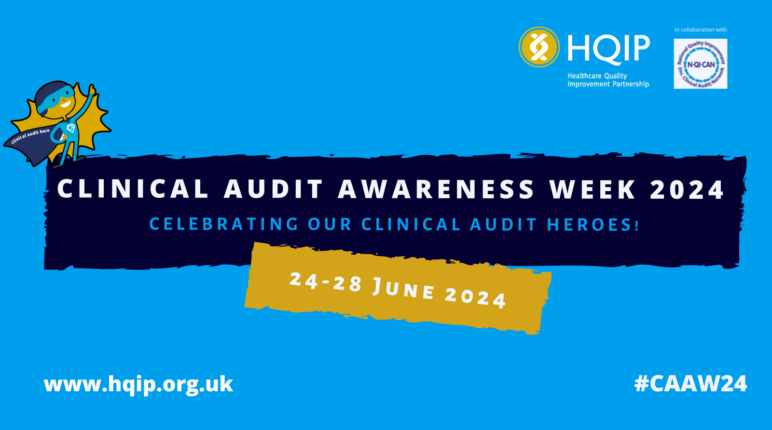Clinical outcomes
Clinical Safety
Celebrating Clinical Audit Awareness Week 2024

In honour of Clinical Audit Awareness Week, we’re celebrating the heroes that are shaping the nation’s healthcare industry, one clinical audit at a time!
In this blog, we’re shining a light on some of the largest national clinical audits happening across the UK; audits that have revealed revolutionary data insights, transformed clinical operations and practices, and ultimately saved thousands of lives.
Why Clinical Audits are an underestimated powerhouse for shaping up healthcare
Essentially, clinical audits are the watchdogs of healthcare; revealing whether services hit the mark or miss it, spotlighting strengths, and pinpointing areas for improvement.
But they’re also so much more than that.
Clinical Audits, when done right, reveal transformative insights about every component of clinical operations. From identifying staff training gaps to pinpointing delays and inefficiencies in surgical procedures due to tray readiness, they uncover countless niche, otherwise undetectable facets of improvement.
They save lives, they reduce resource burden, they save a lot of money, and they push healthcare towards better outcomes. Across the UK, numerous, powerful audits are being undertaken; audits that are shaping healthcare outcomes for the better.
Sentinel Stroke National Audit Programme (SSNAP)

The Sentinel Stroke National Audit Programme (SSNAP), in collaboration with King’s College London, has been voted the most effective national clinical audit in the UK for 10 years running.
The audit is made up of 2 key areas: their clinical audits, which measures the processes by which stroke patients are given care, and their organisational audits, which measure the structure of the stroke services. They produce annual reports and academic analyses for all hospitals across England, Wales and Northern Ireland each year, with the aim to align with the NHS Long Term Plan and measure progress towards those goals.
The data collected from the audits have proved vital for healthcare planning; contributing to local, national, and even international healthcare improvements. For example, data from the audit was used to create the 2017 EU Burden of Stroken reports, which were presented to the EU parliament.
Such reports were able to distinguish and estimate the future impact of stroke, identify inequalities in stroke risk, show the lack of long-term care, and the shortcomings in prevention.
As a result, 2 EU and country-specific guidelines have been created, namely: The Economic Impact of Stroke in Europe and The Stroke Action Plan for Europe 2018-2030.
SSNAP has delivered substantial benefits for stroke patients by pinpointing gaps and inequalities in stroke care, and by offering robust evidence for structures and processes that decrease mortality rates and improve long-term patient outcomes.
Maternal Enhanced and Critical Care (MEaCC) Steering Group

Yorkshire and the Humber’s MEaCC programme was established to bring attention to the growing concerns of increasing maternal mortality rates. A better understanding of what happens to women who deteriorate during childbirth and their care needs was required and so an audit was created in partnership with Athera Insights to address just that.
There is a big focus nationally in maternal care on looking after really sick women,” Dr Deborah Horner, consultant in anaesthetics and critical care explains. “But it turns out that if you only look out for women with complex health problems, you are potentially missing 90% of women who are likely to become ill. No one knew that.
Nine in ten women who require critical or enhanced maternal care during childbirth, are fit and healthy when they arrive at the delivery suite.
The audit, in collaboration with Athera Insights, helped bring to light these issues, but also enabled the establishment of a new care model standard for women who deteriorate during pregnancy. The impact of this model was also tested using auditing with Athera Insights.
This model has been deployed in all 17 maternity units in the region, which cover 10% of births in England.
Again, the audit hasn’t just affected patient outcomes regionally, but on a potentially national scale. The Intensive Care Society’s Maternal Critical Care Group is now writing national guidance based on what has been learned in Yorkshire and the Humber.
Royal College of Anaesthetists National Emergency Laparotomy Audit (NELA)

Every year, over 30,000 patients in England undergo emergency laparotomies, costing the NHS around £650 million. And with a high mortality rate of 12.7%, an audit was deemed necessary in understanding factors to reduce mortality rate and determine success, all anchored in professional standards set by NCEPOD, the Department of Health, and the Royal College of Anaesthetists.
NELA is using clinical audit data for 3 main areas, namely: to improve run charts, data feedback, and understanding the system.
Thousands of collaborators, including clinicians, research nurses and hospital staff, input data into NELA every year, targeting very specific areas to ensure improvements in patient survival are seen.
For example, reports indicated that 15.7% of high-risk emergency laparotomy patients were admitted to regular wards rather than critical care or enhanced care areas post-surgery, which had led to increased mortality rates. Findings such as this have empowered notable achievements across the NELA project; since implementation, there has been a steady reduction in in-hospital mortality, from 12.7% in year 1 to 9.1% and 9.2% respectively.
This decline is attributed to enhanced adherence to clinical guidelines, timely administration of antibiotics, and improved access to critical care facilities, all brought to light by auditing data. NELA’s emphasis on real-time data collection and analysis has allowed participating hospitals to closely monitor their performance, leading to targeted quality improvement initiatives that address deficient areas, and reinforce effective practices.
British Society of Rheumatology (BSR): The National Early Inflammatory Arthritis Audit (NEIAA) and BSR Electronic Patient Reported Outcome Measures (ePROMs)

The BSR required a large-clase auditing system in a short time-frame, and partnered with Athera Insights to achieve just that.
The NEIAA system, which recruited over 12,000 patients in just nine months and is now nearing 70,000 participants, enables patients to report their medical conditions online at various intervals post-visit.
This real-time data visibility has driven high user engagement, making the audit one of the largest of its kind. The audit also serves as a benchmark to regional and national comparators against NICE Quality Standard 33 and other key metrics.
Data is collected for patients with a diagnosis of Early Inflammatory Arthritis (EIA) across 12 months, assessing waiting times, time to treatment, clinical response to treatment and patient-reported outcomes.
The audit’s focus on delivering the best care for their patients, has expanded to now also collect data at diagnosis for some rare immune mediated inflammatory diseases, showcasing just how insightful audit data can be; expanding who healthcare professionals can help.
Meanwhile, the ePROMs system, though smaller in scope, offers extensive charting capabilities for both clinicians and patients to monitor progress. It has been expanded three times to include additional clinical trials, showcasing its versatility and value in patient care.
Cystic Fibrosis Trust Registry

Although technically not an audit, the cystic fibrosis trust registry is a powerful example of just how important and influential data can be.
The revamped CF Registry has integrated 3 clinical trials (VOICE, CF START, and CF STORM) and allows patients to contribute to data collection through online questionnaires.
With 100% participation from all UK specialist centres and clinics and a 99% patient consent rate, the registry’s valuable data positions the Cystic Fibrosis Trust at the forefront of policy and academic influence worldwide.
Notably, the data collected on the use of Kaftrio, an expensive yet highly effective drug for Cystic Fibrosis, played a crucial role in its approval for NHS provision, demonstrating the registry’s significant impact on patient care and treatment decisions.
Changing healthcare, one audit at a time!
As you can see, these heroes of healthcare are making waves, one audit at a time! From a local, national, to an international level, audits have the potential to completely change the healthcare landscape.
At Athera Healthcare we understand that simply offering technology isn’t enough—audits have immense potential that must be fully explored. That’s why we take a partnership approach, collaborating with our customers to exploit every opportunity across the audit’s journey. Our experts are dedicated to ensuring that every aspect of the audit process is leveraged for outcomes that inspire change (like those explored in this blog!).

Book a Demo
Arrange a one-to-one demonstration with a member of our dedicated team. We collaborate to tailor the experience so you can see how our solutions can be applied in your specific context and utilised effectively to achieve your objectives.